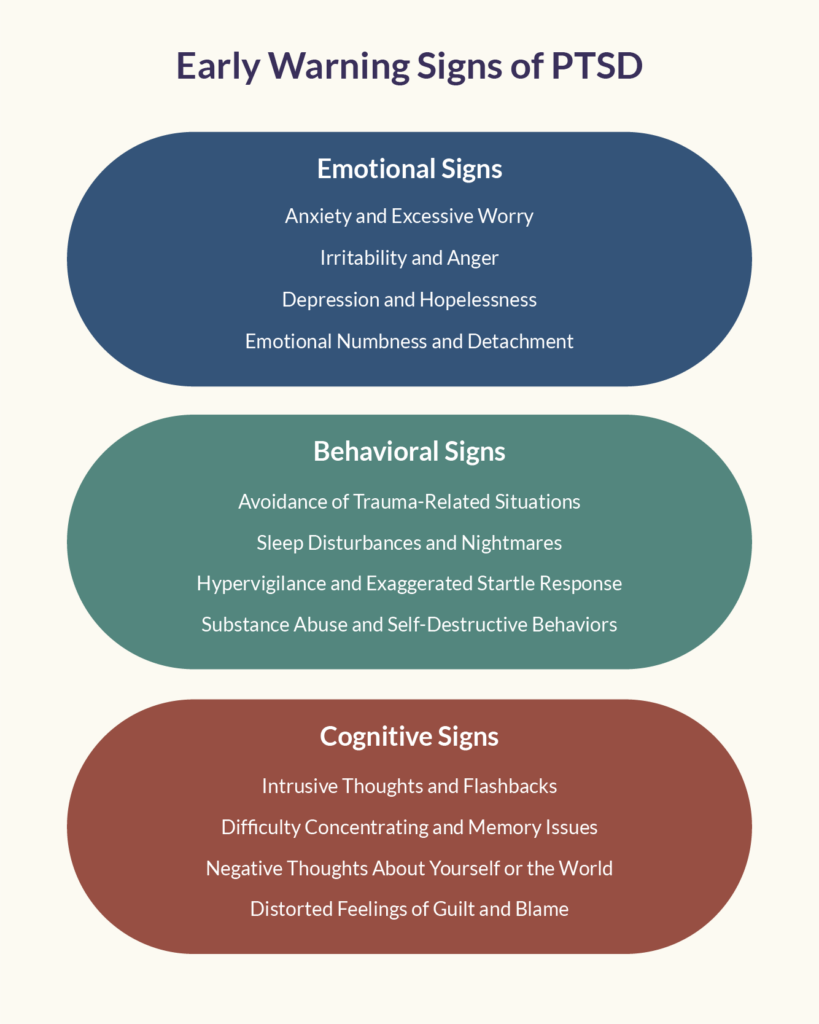Post-traumatic stress disorder, or PTSD, is a debilitating mental illness that can manifest after experiencing traumatic events. The disorder affects 5% of U.S. adults — more than 10 million people — yearly. Though historically associated with combat veterans, PTSD can affect anyone.
People with PTSD experience a wide range of symptoms. If left untreated, the disorder may affect all aspects of their lives — from intimate relationships to physical health. But with early detection, it’s possible to manage symptoms and treat PTSD before it causes significant damage. Read on to learn the early signs of PTSD, including common symptoms and effective treatments.

What Is Post-Traumatic Stress Disorder?
Post-traumatic stress disorder (PTSD) is a mental health condition brought on by a traumatic event. Developing PTSD through sexual assault, childhood abuse, witnessing death and other traumatic events are some of the most common causes. Such events may be life-threatening or emotionally harmful and can trigger PTSD whether they’re witnessed or experienced firsthand.
People who go through trauma may find ways to cope and move on (a phenomenon known as acute stress disorder). But if traumatic memories continuously interfere with everyday tasks, it could be a sign of PTSD.
Why Early Detection of PTSD Matters
PTSD might not appear for months or even years after a traumatic event. But when symptoms do manifest, they can be extremely disruptive. For this reason, quick detection of the condition is essential. The sooner behavioral, physical and mood symptoms are recognized, the sooner they can seek help. If left unchecked, PTSD symptoms may cause significant harm to a person’s mental health, career and relationships.

The Early Warning Signs of PTSD You Need to Know
Severe cases of PTSD don’t show up overnight. They often manifest gradually, with some symptoms acting as warning signs. PTSD symptoms take many forms and can affect a person emotionally, behaviorally and cognitively. Identifying PTSD symptoms early can help you seek treatment quickly. Here are some common signs to look out for.
Emotional Signs of PTSD
Behavioral Signs of PTSD
Cognitive Signs of PTSD
Seeking Support and Treatment for PTSD
Recognizing the early warning signs of PTSD is the first step toward overcoming the condition. Luckily, there are plenty of options when it comes to the treatment of mental health problems. Professional support is vital to heal and move on from the past fully.
Talk therapy is a common method that can help you identify and deal with traumatic event avoidance symptoms and the denial phase. This typically consists of individual and group work with a mental health professional to guide you through the healing process of mental disorders. It can also be done through an inpatient mental health program or an outpatient mental health program.
A partial hospitalization program for mental health is a form of outpatient treatment. With this method, you’ll spend several hours at a treatment facility a few days each week, attending therapy and participating in other activities. Then, you’ll return home for the rest of the week.
PHPs are a useful way to develop a support system that can turn Post-traumatic stress disorder (PTSD) into positive emotions and complete healing. Surrounding yourself with professionals and others with PTSD can be extremely empowering and may lead to a quicker recovery.

Behavioral Health Centers in Florida: A Different Way of Treating PTSD
Coping with PTSD is challenging, but you don’t have to endure it alone. At Behavioral Health Centers in Florida, you’ll find a group of mental health professionals ready to help you overcome your condition. Get your PTSD treated by Behavioral Health Center’s experienced and compassionate team.
It’s never too late to put an end to PTSD. Submit an insurance form today to get started with your treatment.






